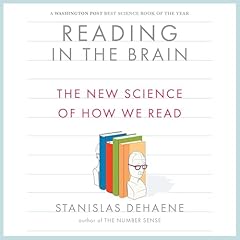
Proust and the Squid
The Story and Science of the Reading Brain
No se pudo agregar al carrito
Solo puedes tener X títulos en el carrito para realizar el pago.
Add to Cart failed.
Por favor prueba de nuevo más tarde
Error al Agregar a Lista de Deseos.
Por favor prueba de nuevo más tarde
Error al eliminar de la lista de deseos.
Por favor prueba de nuevo más tarde
Error al añadir a tu biblioteca
Por favor intenta de nuevo
Error al seguir el podcast
Intenta nuevamente
Error al dejar de seguir el podcast
Intenta nuevamente
$0.00 por los primeros 30 días
POR TIEMPO LIMITADO
Obtén 3 meses por US$0.99 al mes
La oferta termina el 29 de enero de 2026 11:59pm PT.
 Exclusivo para miembros Prime: ¿Nuevo en Audible? Obtén 2 audiolibros gratis con tu prueba.
Exclusivo para miembros Prime: ¿Nuevo en Audible? Obtén 2 audiolibros gratis con tu prueba.
Solo $0.99 al mes durante los primeros 3 meses de Audible Premium Plus.
1 bestseller o nuevo lanzamiento al mes, tuyo para siempre.
Escucha todo lo que quieras de entre miles de audiolibros, podcasts y Originals incluidos.
Se renueva automáticamente por US$14.95 al mes después de 3 meses. Cancela en cualquier momento.
Elige 1 audiolibro al mes de nuestra inigualable colección.
Acceso ilimitado a nuestro catálogo de más de 150,000 audiolibros y podcasts.
Accede a ofertas y descuentos exclusivos.
Premium Plus se renueva automáticamente por $14.95 al mes después de 30 días. Cancela en cualquier momento.
Compra ahora por $19.10
-
Narrado por:
-
Kirsten Potter
-
De:
-
Maryanne Wolf
Los oyentes también disfrutaron:




















Reseñas de la Crítica
"Wolf's alarm about the spread of semi- literacy among the young is obviously justified, and her book provokes thought about it as only reading can." ( Sunday Times London)
"Blindingly fascinating...detailed and scholarly....There's a lot of difficult material in here. But it's worth the effort....For people interested in language, this is a must. You'll find yourself focusing on words in new ways. Read it slowly--it will take time to sink in." ( The Sunday Telegraph)
"Blindingly fascinating...detailed and scholarly....There's a lot of difficult material in here. But it's worth the effort....For people interested in language, this is a must. You'll find yourself focusing on words in new ways. Read it slowly--it will take time to sink in." ( The Sunday Telegraph)
Las personas que vieron esto también vieron:


















I want to buy this for every teacher I know! A must read for every educator.
Se ha producido un error. Vuelve a intentarlo dentro de unos minutos.
Great read
Se ha producido un error. Vuelve a intentarlo dentro de unos minutos.
The first and last thirds were interesting but I got lost during the middle section about how people learn to read. This book explains some complicated processes that I would need to read over and over again to understand and this is difficult when listening while driving. So if you are really interested, you should get a paper copy.
I am unsure if the book would have held my attention enough to finish if I had read a paper copy instead. I think it could benefit from more of an overarching personal storyline of how the reader came to learn about how reading works in her own education/research. This would hold my attention much more to be able to make sense of the dry facts as part of her inquiry into the subject.
I picked up this book because I am interested in learning and teaching in general and it held my interest enough to finish the audiobook. The first section about the history of reading actually made me very curious and happy so the book was worth it for that section alone.
Deserves your full attention
Se ha producido un error. Vuelve a intentarlo dentro de unos minutos.
Fascinating
Se ha producido un error. Vuelve a intentarlo dentro de unos minutos.
Would you listen to Proust and the Squid again? Why?
Yes, I would listen to Proust and the Squid again because reading along with the book gives you a better understanding of what the author is writing about.Which scene was your favorite?
My favorite scene was how wolf shows us how the dyslexic brain worksDid you have an extreme reaction to this book? Did it make you laugh or cry?
The book open my eyes on how people treat others when they learn differently from them.A Great Read
Se ha producido un error. Vuelve a intentarlo dentro de unos minutos.


